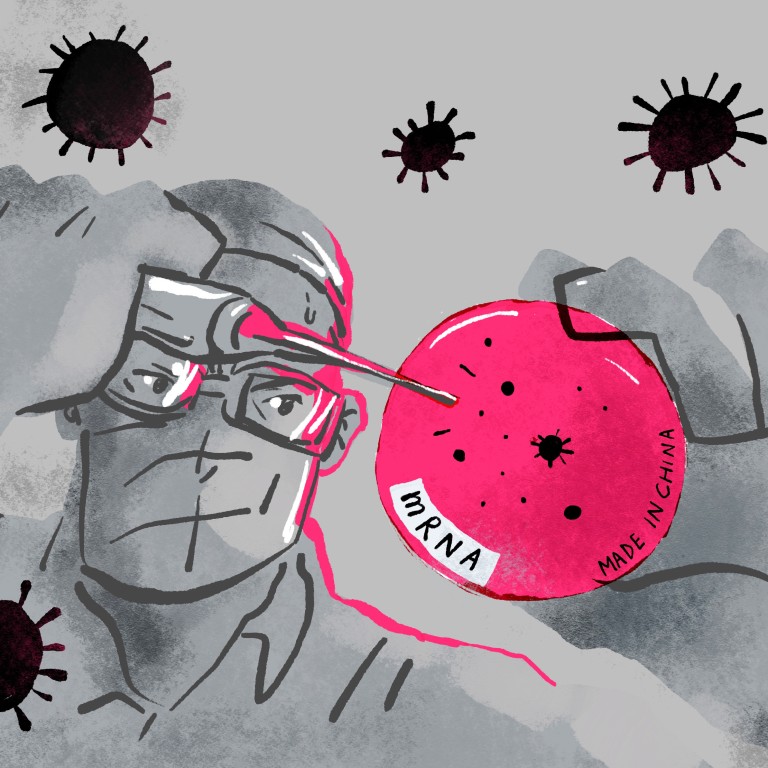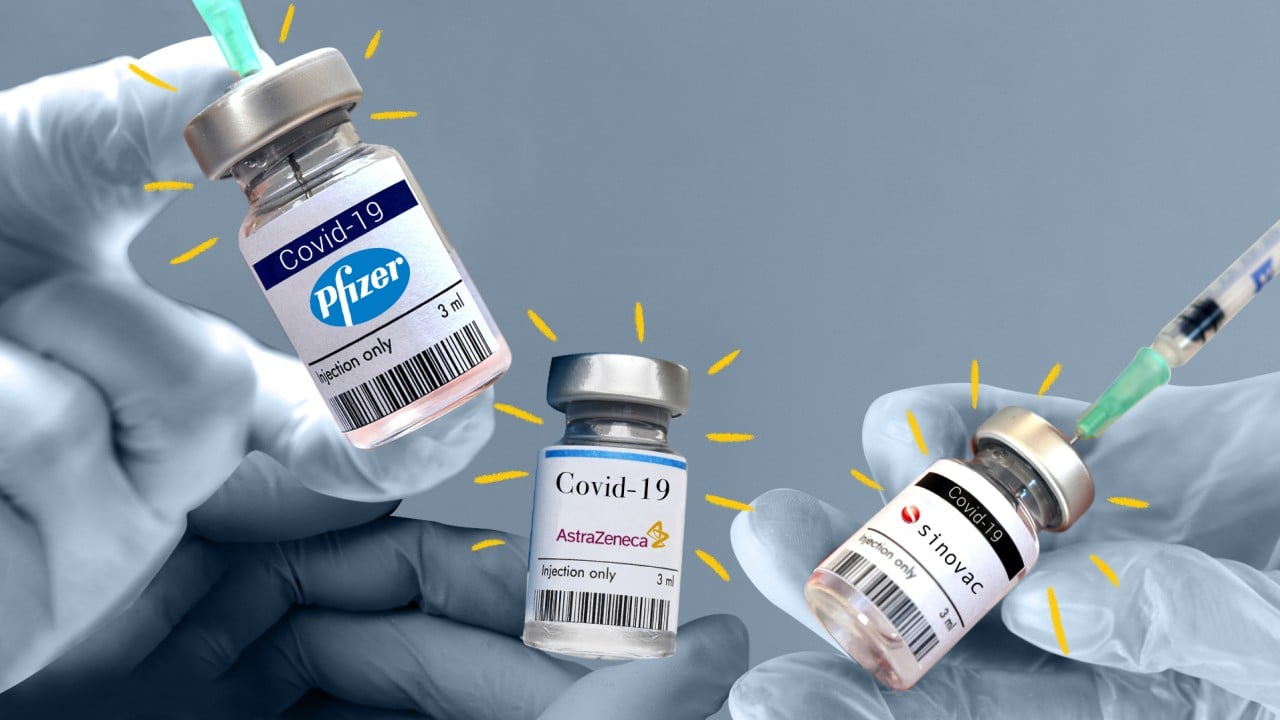
Can China’s home-grown mRNA Covid-19 vaccine pass its final tests?
- No serious adverse effects recorded in phase 1 clinical trials but scientists say everything hinges on large-scale study
- China has so far relied on vaccines developed through traditional technology which are less effective against Omicron and Delta
No serious adverse events were recorded in the phase 1 clinical trial data, published last week by The Lancet Microbe, but scientists said it was too early to judge its success.
Large-scale trials of the vaccine – jointly developed by the Academy of Military Science, Walvax Biotechnology and Suzhou Abogen Biosciences – have been delayed since last year. No reason was given by the company, though it has become generally more difficult to recruit unvaccinated volunteers for phase 3 trials.
Last week a company official said most volunteers had now been recruited, though he refused to give a timeline for the phase 3 trials.
According to online database clinicaltrials.gov, the trials will involve 28,000 participants in Mexico and Indonesia, who will be given ARCoV in two 15 microgram doses, 28 days apart.
Indonesia, Mexico approve phase 3 trials of Chinese mRNA vaccine hopeful
So far, China has relied on inactivated vaccines – which use traditional technology but are less effective against the Omicron and Delta variants – to protect its population against the virus.
No overseas-developed mRNA vaccines have been approved by the Chinese regulator. Shanghai-based Fosun Pharmaceuticals has come the closest, winning a recommendation from the government’s expert panel in July for the Pfizer/BioNTech jab.
Fosun has exclusive rights to distribute the Pfizer/BioNTech vaccine in Greater China, but supply has been restricted to Hong Kong, Macau and Taiwan while it awaits regulatory approval – the next and final step after the expert panel’s endorsement.
Most analysts believe China is waiting for a home-grown version so it will not have to rely on imported booster shots using the cutting edge technology. So far, the most effective vaccines have been mRNA jabs from Pfizer/BioNTech and Moderna.
Front runner ARCoV’s phase 1 trial involved 120 volunteers at a hospital in Hangzhou, Zhejiang province, in eastern China, according to the published paper.
The participants were divided into groups and given two doses of varying strengths, with a 28-day interval. The trial found 15mcg to be the most effective dosage, able to generate about twofold more neutralising antibodies than typically found in recovered Covid-19 patients.
Trials of Pfizer/BioNTech’s vaccine showed it can generate threefold the amount of neutralising antibodies, but analysts said no comparison can be made with the ARCoV result because of the different analytic procedures used in the trials.
What are the coronavirus mRNA vaccines and how do they work?
John Moore, professor of microbiology and immunology at Weill Cornell Medical College in New York, said the outcome of ARCoV’s initial trials “looks pretty standard” with “no obvious red flags”.
“Is the vaccine any good? As we all know, it’s not possible to estimate efficacy from phase 1 or phase 2 trials – although some companies are now trying to do that – because of the use of non-standardised assays worldwide,” he said.
Scientists are also interested to learn how the vaccine is designed, which they say will be important for its success. Few details were revealed by the developers in the latest paper, or in an earlier one about its animal experiments published in July by the science journal Cell.
“It still is hard to know what specific changes were used for the mRNA and the lipid nanoparticle (LNP),” said Jerome Kim, director general of the International Vaccine Institute.
The mRNA vaccines work by introducing a piece of synthetic mRNA wrapped in an LNP, the oily coating which helps deliver the vaccine and is considered the key technology for unlocking its potential.
Terry Nolan, a professor with the University of Melbourne’s Peter Doherty Institute, said the ARCoV developers had given “superficial” descriptions about the LNP they were using.
Only a handful of companies around the world supply LNP because of intellectual property rights. ARCoV’s developers have previously said they developed their own LNP.
Scientists also want to know what modifications have been made to the mRNA itself. Many believe it is these modifications which can be crucial to a vaccine’s success.
The vaccines developed by Pfizer/BioNTech and Moderna use pieces of synthetic mRNA which correspond to the whole spike protein of the novel coronavirus behind Covid-19. However, the mRNA was also modified to circumvent the body’s inflammatory reaction to foreign mRNA.
Nolan, from the Doherty Institute, said the ARCoV developers had made no mention of the way in which they created the mRNA, leaving questions over refinements which other manufacturers had found necessary to make their vaccines effective, while reducing adverse reactions.
One known difference is that both Pfizer/BioNTech and Moderna target the entire spike protein, while ARCoV targets only its tip, known as the receptor-binding domain (RBD), that the virus uses to dock with the body’s receptors and cause infection.
The approach is similar to another BioNTech Covid-19 mRNA vaccine which was eventually abandoned, and might explain ARCoV’s relatively strong expected reactions in trial participants, according to Nolan.
BioNTech’s decision to drop its RBD experimental vaccine was because of its stronger reactogenicity, but scientists still had not figured out why that was the case, he said.
In the ARCoV trial, according to the paper, the most severe side effect was fever, with similar reactions after first and second dose.
Of the 20 volunteers who received the 15mcg doses, 85 per cent developed fever – with severe temperature rises above 39 degrees Celsius (102 Fahrenheit) in 30 per cent – within seven days of vaccination.
Scientists said the number may change with larger studies, but so far ARCoV’s reactogenicity is within a tolerable range, although reactions are on the strong side.
Nolan said that, if successful, an mRNA vaccine targeting RBD would have its advantages, particularly as other candidates in development for the Omicron variant by Pfizer/BioNTech continue to use the entire spike protein.
One reason is that, by specifically targeting the most important site that attaches to a human cell, an RBD vaccine could reduce the chance of a new antigen confusing the immune system by generating the same antibodies as previous jabs.
“[The unnecessary antibodies] are not critical for protection, and may lead to a reduction in protection, particularly with repeated boosters. So the receptor binding domain, in theory, is quite attractive,” Nolan said.
The International Vaccine Institute’s Kim said another important piece of information is the incidence of myocarditis – a rare side effect of other mRNA vaccines, especially among young males.
He suggested a non-inferiority study – to compare the ARCoV vaccine with other mRNA vaccines in terms of side effects and neutralising antibodies – would help.
China is unlikely to carry out any comparison studies, leaving scientists to await ARCoV’s phase 3 results.
Pfizer-BioNTech shot works against mutation in new virus strains: study
“So, will this mRNA vaccine be a Pfizer/Moderna type of success or a CureVac-style failure? Only phase 3 data will really tell us the answer,” said Moore, from the Weill Cornell Medical College.
Kim said the ARCoV vaccine looks promising, adding scientists would want more information about how effectively its 15mcg dosing can neutralise Omicron and Delta.
ARCoV’s developers say they are also exploring how to get around the deep freezing storage requirements of other mRNA vaccines. According to last year’s paper in Cell, they have successfully stored the jabs at room temperature for up to a week.
Pfizer-BioNTech jabs need to be kept at well below zero. The Moderna vaccine can last for up to a month in a fridge, but needs ultra-low temperatures for longer-term storage.


